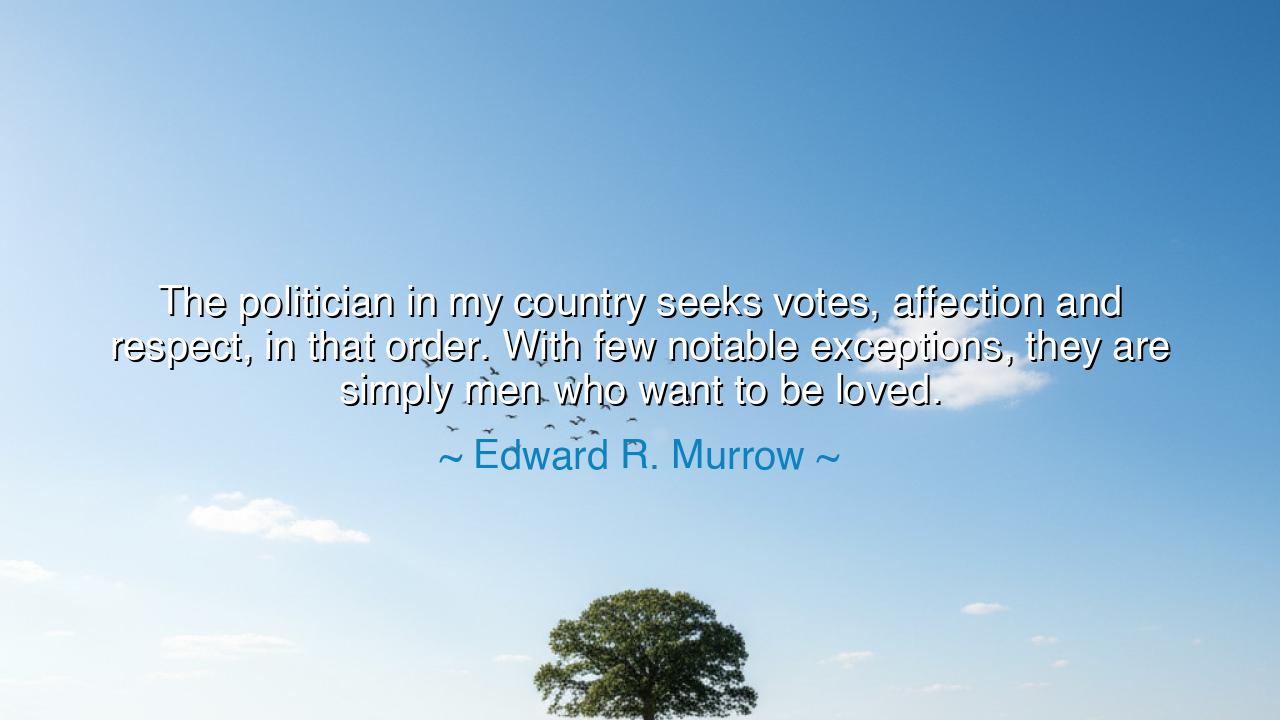
The politician in my country seeks votes, affection and respect
The politician in my country seeks votes, affection and respect, in that order. With few notable exceptions, they are simply men who want to be loved.






"The politician in my country seeks votes, affection, and respect, in that order. With few notable exceptions, they are simply men who want to be loved." These words from Edward R. Murrow strike at the heart of political ambition and the human desire for approval. Murrow, a revered journalist, cuts through the layers of political rhetoric to reveal a universal truth: that many politicians, at their core, are driven not by a lofty sense of duty but by the yearning for love and recognition. His statement speaks to the fragility of the political profession, where votes and affection are often sought after as measures of personal worth, rather than a commitment to service or the greater good. The respect that comes last is often seen as a secondary prize, earned only after winning the affection and loyalty of the people.
In the ancient world, political leaders often sought the love and adoration of their people, as their reputation and legitimacy were deeply tied to public opinion. The Romans, for example, recognized the importance of popularity in maintaining their power. Leaders like Julius Caesar understood that respect was not easily granted, and therefore, they carefully crafted their public personas to win the affection of the masses. Caesar’s crossing of the Rubicon was not just a military move; it was a declaration of personal ambition, as he sought to consolidate his power and elevate his stature, not just as a leader but as a figure who could command the love of Rome. Yet, this desire for affection and admiration also led to his downfall—reminding us that political success driven solely by the need for love can be precarious, as it often lacks the firm foundation of principled leadership.
Similarly, in Greece, Alexander the Great’s desire to be respected and loved by his people was one of his driving forces. He spread his empire across vast regions, not only through military conquest but by cultivating his image as a divinely inspired ruler. His effort to blend Greek and Persian cultures in his reign was an attempt to gain the affection of those he conquered, securing respect through acts of inclusion. Yet Alexander’s eventual demise was a reminder that love, when pursued at the expense of true respect for others, could be fleeting and easily lost. Like many modern politicians, Alexander’s leadership was often defined by his charisma and image, but these were not always enough to hold together the vast empire he created.
Murrow’s observation about politicians seeking votes before respect mirrors the modern reality of political campaigns, where charisma, popularity, and affection often take precedence over a deeper commitment to service. This is exemplified in the way modern campaigns are run: speeches are crafted not to inform or inspire but to entertain and emotionally engage voters. Politicians focus on creating a personal brand, using media and marketing strategies to build a connection with the electorate, often focusing on superficial aspects of personality rather than deep policy changes or true public service. The focus on votes first, and respect second, creates a system where the measure of a politician’s success is often based on their ability to be loved, rather than their ability to lead with integrity.
The lesson from Murrow’s words is that true leadership is not driven by the need to be loved, but by the commitment to serve the people, guided by a strong sense of duty and principle. Respect, earned through hard work, honesty, and service, must come before affection. A leader’s actions—not their ability to charm or entertain—should determine their place in society. Just as the great philosophers of the ancient world emphasized the importance of virtue and wisdom over popularity, so too must we recognize that true respect cannot be won through superficial means. Political success should not be measured by the amount of love or affection a leader can garner, but by the lasting impact they leave on the community, grounded in values and integrity.
In our own lives, we can draw from this wisdom by focusing on genuine respect over personal validation. Whether we are leaders in our communities, workplaces, or families, we must seek to earn respect through our actions and principles, not through the need for affection or admiration. True leadership is about making difficult decisions that may not always make us popular, but that are in the best interest of the people we serve. By staying grounded in honesty, integrity, and a commitment to the greater good, we can create a lasting impact, rather than fleeting popularity. Just as Murrow warned, we must remember that respect is the true measure of a leader, not the superficial love of the masses.
Ultimately, the path to genuine respect is paved with sacrifice, honor, and service, not by the pursuit of affection or public approval. We must strive to be leaders who act with conviction, knowing that the respect we earn will come from those who recognize our commitment to higher ideals. Like the ancients, who valued virtue over fame, we must pursue a life of integrity, understanding that true success lies not in being loved, but in being honored for our actions and the legacy we leave behind.






AAdministratorAdministrator
Welcome, honored guests. Please leave a comment, we will respond soon